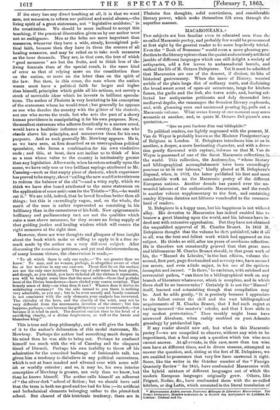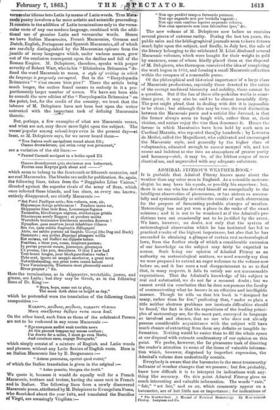MACARONEANA.*
• Maaoroneana Andra, overeat Nouveaux Maanges de Literature Macaronigue. Par Octave Delepierre, Membre honoraire de la Societe des Antiquaires de Londres, &e. London: Trubner and Co. FEW subjects are less familiar even to educated men than the so-called Macaronis poetry, and probably few would be pronounced at first sight by the general reader to bo more hopelessly trivial. Even the " Book of 'Nonsense " would seem a more pleasing pro- ductionto the literary epicure than the quaint and curiously artificial jumble of different languages which can still delight a society of antiquaries, add a few leaves to ambassadorial laurels, and enthral the life of M. Octave Delepierre. Yet it must be admitted that Macaronies are one of the dearest, if dirtiest, tit-bits of historical gastromancy. When the muse of History, wearied awhile of the plain large diet of ordinary truth, and disdaining the broad sweet scent of open-air occurrence, longs for kitchen fumes, the garlic and the leek, she turns aside, and, having-col- lected her antiquarian petticoats and duly descended into mediawal depths, she rummages the frouziest literary cupboards, and, with gleaming eyes and moistened pouting lip, pulls out a Macaronic volume. 'What seems frouzy at one moment may seem aromatic at another, and, to quote M. Octave Delepierre's own quotation,- " Que ne peat l'ardeur d'un vrai bibliophile !"
To political readers, too lightly engrossed with the present, M. Van de Weyer is probably known as the Minister Plenipotentiary of Belgium in London. M. Delepierre introduces him to us in another, a deeper, a more fascinating character, and with a devo- tion gently flavoured with rapture, informs us that M. Van tie Weyer is possessed of one of the finest Macaronis eollection,s. in. the world. This collection, the Ambassadpv, " whose literary and bibliographical accomplishments have been exceedingly precious to us in our labours," kindly placed at M. Delepierre's disposal, when, in 1852, the latter published his first and most considerable work on the Macaronic poetry of the different European nations. Another decade has passed over the un- wearied labours of the enthusiastic Macaronian, and the result is another volume supplementary to the first, and containing sundry Elysian dainties not hitherto vouchsafed to the common- herd of readers.
M. Delepierre is a happy man, but his happiness is not without alloy. His devotion to Macaronies has indeed enabled hint to bestow a great blessing upon the world, and his labours have in- deed met with extensive approbation. But they have not obtained the unqualified approval of M. Charles Brunet. In 1852 M. Delepierre thought that the volume he then published -take it all in all, was the best and fullest work which had appeared on the subject. He thinks so still, after ten years of assiduous reflection. He is therefore not unnaturally grieved that that great man and hibliomaniac M. Charles Brunet should, iu that great work of his, the " Manuel du Libraire," in the last edition, volume the second, first part, page five hundred and seventy-two, have seemed too severe, and even a little unjust, in his use of the epithets incomplete and inexact. " Is there," he exclaims, with subdued and reverential pathos, " can there be a bibliographical work on any branch of literature whatsoever, which is complete, and in which there shall be no inaccuracies ? Certainly it is not the "Manuel ' itself, learned and astonishing though that compilation may be. And he adds gently, " It is precisely because I appreciate to its fullest extent the skill and the vast bibliographical acquirements of M. Charles Brunet, that I feel such regret at having incurred ' the master's' rebuke, and that I here slide in my modest protestation." Thus meekly might Isaac have answered Abraham, when rashly snubbed on post-Adamito genealogy by patriarchal lips.
If any reader should now ask, but what is this Macaronic poetry ?—we are compelled to observe, without any wish to be impertinent, that a fool may ask a question which ten wise men cannot answer. At all events, in this case, more than ten wise men have at different times, and in divers seasons, attempted to answer the question, and, sitting at the feet of M. Delepierre, we are enabled to pronounce that very few have answered it right. Some, like the writer in the October number of the " Foreign Quarterly Review " for 1845, have confounded Macaronies with the hybrid mixture of different languages out of which the modern European languages originally grew. Others, like Peignot, Nodier, &c., have confounded them with the so-called kitchen, or dog Latin, which consisted in the literal translation of vermicular idioms into Latin by means of Latin words. True Macs.- ronlopoetry involves a far more artistic and scientific proceeding. It consists in the addition of Latin terminations only to the verna- cular roots of any one modern language, combined with the addi- tional use of genuine Latin and vernacular words. Hence we have Italian Macaronies, French Macaronies, German and Dutch, English, Portuguese and Spanish Macaronies, all of which are carefully distinguished by the Macaronian epicure from the jumble of many languages which, under various names, grew out of the confusion consequent upon the decline and fall of the Roman Empire. M. Delepierre, therefore, speaks with proper severity of Robert Watt, who in his " Bibliotheca Britannica " de- fined the word Macaronis to mean, a style of writing in which the language is purp9sely corrupted. But in the "Encyclopaedia Britamiica " " c'est encore hien pire !" There the article being much longer, the author found means to embody in it a pro- portionately larger number of errors. We have not been able to consult the new edition of the " Encyclopedia Britannica " on the point, but, for the credit of the country, we trust that the labours of M. Delepierre have not been lost upon the writer entrusted with the imnortant task of defining Macaronies therein.
But, perhaps, a few examples of what are Macaronic verses, and what are not, may throw more light upon the subject. The verses popularamong school-boys even in the present day—at least, so M. Delepierre says, for we never heard them-
" Tres fmtres coeli navigabant round about Eli ;
Omnes drownderuut, qui swim away non potuerunt,"
are a variation of the old lines:-
" Fratrei Carmeli navigant in a bothe apud Eli
Omnes drencherunt quia sterisman non habuerunt, Endres cum Knyvys goth about and --"
which seem to belong to the fourteenth or fifteenth centuries, and are real Macaronies. The blanks are unfit for publication. So, again, the following lines, taken from the " Buggiados Liber Unions," directed against the superior rivals of the army of fleas, which once infested these islands, and has since, as every one knows, entirely disappeared, are chiefly Macaronic :—
" Sat Petri Paulique satin; fera vulnera, now, sir,
Majoresque doings celebrantur ! Pandere mens est, Skippantes hint inde fleas, Loussosque fugatos Ttirmatim, bloodnmque nigrum, crackataque gristla Bitantesqne sorely Buggos ; et pondere multo Wretchida bruisantes timidarum membra flearum !
Nymphae, quas sanctum juvat inhabitare Glenna Seta vos, quae colitis fragrantia Bilingsgati Atria, me whit° portate ad limpida Georgi (the Dog and Duck) Streamata ; seu potius Bagniggi plungere wellis Est animus, vel Sadleri me dippers totum
Fontibus, o bless you, come, inspirare poetam; In pectus pourate meum, jeerosque, ginumque Ut possim, like you, describere. 0 that I now had Your brassi lunges, your blackguardissima verbs ITrbs erat, ignoro an mappis markatur, a great town Notwithstanding. nec great town cessat haberi 'Tams Verminopolis, Thamesis most pleasantly seated
Rivos propter ; " &c.
Here the terminations, as in skippantes, wretchida, jeeros, and ginum, are Latin ; but they may be Greek, as in the following lines of Dr. King:— "Boys, boys, come out to play,
The moon doth shine as bright as day,"
which he pretended were the translation of the followtng Greek composition :—
KW.141.Eri, ifhEigelEV, t.tenf3oras, nuAtcere wXarsn, Moo ccraogpecras OngEpsl Tom youva Sca7.
On the other hand, such lines as these of the celebrated Porson are not to be reckoned in any sense Macaronic :—
" Ego nunquam audivi such terrible news At this present tempus my senses confuse; I'm drawn for a wiles, I must go cum Marie, And concinus ease, engage Bonaparte,"
which simply consist of a mixture of English and Latin words and phrases, without any Latin flexion of English roots. Here is an Italian Macaronic line by II. Bergamasco
"Asians punctatus, oportet quod trottet," of which the Italian translation is given in the original :—
"Azino ponzito, bisogna the trotti."
We quote it, because it would do equally well for a French Macaronic, trottare and trotter, having the same root in French and in Italian. The following lines from a newly discovered Macaronic poem, attributed by M. Delepierre to Evangelista Fossa, who flourished about the year 1494, and translated the Bucolics pi Virgil, are amusingly Virgilian:—
" Non ego perdivi tempus futnendo pntanas, Non ego zngando non per bordello vagando ; Non ego cum canibus lepores sequendo veloces, Non cum sparueris non cum falconibus ipso," &c.
The new volume of M. Delepierre now before us contains several pieces of extreme rarity. During the last ten years, the public sales and the bibliographical journals seem to have thrown much light upon the subject, and finally, in July last, the sale of
the library belonging to the celebrated M. Libri disclosed several Macaronic volumes, which were bought for their weight in gold by amateurs, some of whom kindly placed them at the disposal of M. Delepierre, who thereupon conceived the idea of completing the work begun in 1852, and forming a small Macaronic collection within the compass of a reasonable purse.
Of the philosophical and historical importauce-of a large class
of Macaronic productions, especially those devoted to the satire of the corrupt medieval hierarchy and nobility, there cannot be a question. But if the fun of these olla-podridan works is some- times great, it may also be said to be almost invariably dirty. The poet might plead, that in dealing with dirt it is impossible to be clean ; but although this may be true, the real distinction between the Macaronic poets and a satirist like Juvenal, is that the former always seem to laugh with, rather than at, their victims, and rather enjoy the vice than denounce it. Hence the favour in which Macaronies have been held by such men as Cardinal Mazarin, who repeated themby hundreds ; by Lorentio de Medici, called the Magnificent, who cultivated and encouraged the Macaronic style, -and generally by the higher class of voluptuaries, educated enough to savour mongrel wit, and too coarse and indolent to rise into an atmosphere of greater purity and harmony—sick, it may be, of the lifeless corpse of mere classicalism, and unprovided with any adequate substitute.































 Previous page
Previous page